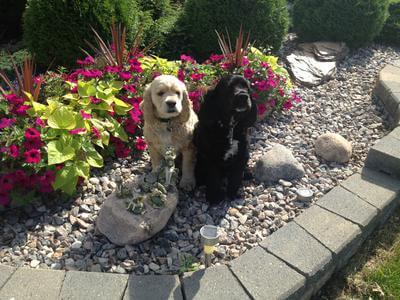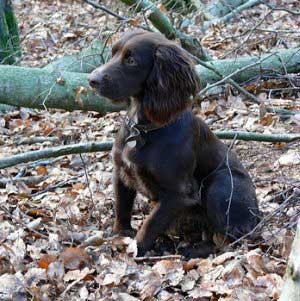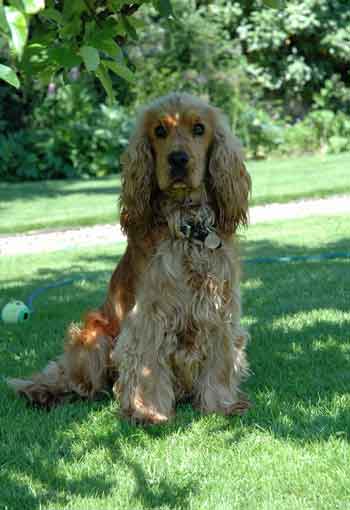- Home
- Cocker Spaniel Health Issues
- Poisonous plants
Poisonous Plants
Poisonous plants can be harmful to our dogs. Unfortunately, our Spaniels won't know which plants are safe and which are toxic; there's no 'doggie radar' to warn them off. So it's down to us to understand which plants can harm our pets and protect them from accidental poisoning.
A to Z of Poisonous Plants
You wouldn't want your puppy to eat anything that could harm him, would you? Of course you wouldn't, so here's a list of many toxic plants to help you keep your Cocker Spaniel safe.
 No poisonous plants here!
No poisonous plants here!'A'
- African Violet
- Aloe
- Anemone
- Amaryllis
- Apple core
- Apricot stone
- Asparagus fern
- Aubergine leaves
- Avocado leaves and skin
- Azalea
'B'
- Belladonna
- Black-Eyed Susan
- Bleeding Heart
- Bluebell
- Bottle-brush flowers
- Boxwood
- Bracken
- Buttercup
'C'
- Cactus
- Cherry Laurel
- Christmas Tree needles
- Chrysanthemum
- Clover
- Columbine
- Common Privet
- Creeping Fig
- Crocus Bulbs
- Cyclamen
'D'
- Daffodil
- Dallas Fern
- Day Lillies
- Deadly Nightshade
- Delphinium
- Desert Azalea
- Devil's Ivy
- Dichelostemma
- Dieffenbachia
- Dogwood fruit
'E'
- Earth Star
- Easter Daisy
- Easter Orchid
- Elephant Ears
- Elderberry leaves
- English Hawthorn
- Euphorbia
'F'
- Foxglove
- Flax
- False Bittersweet
- False Hellebore
- Feather Geranium
- Field Horsetail
- Field Pennycress
'G'
- Garden Chamomile
- Garden Hyacinth
- Gardenia
- Garlic
- Geraniums
- Giant Aster
- Gerber Daisy
'H'
- Hemlock
- Holly Berries
- Honeysuckle
- Horse Chestnut
- Horse Nettle
- Hyacinth bulbs
- Hydrangea flower buds
'I'
- Impala Lilly
- Impatience
- Indian Hemp
- Indian Rubber Plant
- Iris bulbs
- Iris Plants
- Irish Moss
- Ivy
'J'
- Jacob's Ladder
- Jade Plant
- Japanese Aralia
- Japanese Holly Fern
- Japanese Moss
- Japanese Yew
- Jasmine
- Juniper needles, stems, berries
'K'
- Kalanchoe
- Kaffir Lily
- Kiss Me Quick
I couldn't find many poisonous plants beginning with 'K'! If you know of any, please drop me a line and let me know.
'L'
- Laburnum
- Larkspur
- Laurel
- Lily of the Valley
- Lobelia
- Lupin
- Lantana
- Lady of the Night
'M'
- Marsh Marigold
- Maiden's Breath
- Milkweed
- Mistletoe berries
- Mock orange fruit
- Mother-In-Law's Tongue
- Morning Glory
'N'
- Narcissus bulbs
- Nightshade
- Needlepoint Ivy
- Nicotiana
- Nephthytis
- Nasturtium
- Naked Lady
'O'
- Oak (acorns and leaves)
- Oleander
- Onion
- Orange
- Orange Day Lilly
- Oregon Holly
- Ornamental Pepper
- Oilcloth Flower
'P'
- Pear core and skin
- Peony
- Periwinkle
- Philodendron
- Pine Needles
- Poinsettia
- Poison Hemlock
- Poison Ivy
- Poison Oak
- Poppy
- Pot Mum
- Potato plant (shoots and eyes)
- Primrose
- Privet Shrub
'Q'
I couldn't find any poisonous plants beginning with 'Q'!
If you know of any, please drop me a line and let me know.
'R'
- Ragwort
- Red Clover
- Red Maple
- Rhododendron
- Rhubarb Plants
- Red African Violet
'S'
- Scarlet Pimpernel
- Snapdragon
- Snowdrop
- Solomon's Seal
- Spider Plant
- Stinging Nettles
- St James Wort
- Swiss Cheese Plant
'T'
- Tiger Lily
- Tobacco Plants
- Tobacco Leaves
- Tomato Plant (all parts, except for the ripe fruit)
- Tulip bulbs
- Taro
- Taro Vine
'U'
- Umbrella Plant
- Umbrella Tree
- Urbinia
'V'
- Venus Fly-trap
- Verbena
- Virginia Creeper
'W'
- Weeping Fig
- Wandering Jew
- Water Hyacinth
- Wild Cherry
- Wisteria
'X'
I couldn't find many poisonous plants beginning with 'X'!
If you know of any, please drop me a line and let me know.
'Y'
- Yew
- Yellow Pine Flax
- Yellow Oleander
- Yarrow
- Yukka
'Z'
- Zebra Haworthia
- Zucchini
Reactions And Symptoms To Poisonous Plants
Poisonous plants can contain many different types of toxins, resulting in different reactions and symptoms.
Common Reactions To Toxic Plants
Reactions to plants that are poisonous can vary from very mild to severe, but the most common reactions are:
- swelling of the mouth, lips and tongue, which can make breathing difficult,
- throat irritation,
- drooling,
- itching,
- mild skin
rash,
- vomiting and diarrhoea,
- abdominal pain, cramps,
- asphyxiation.
Reactions to Eating Highly Toxic Plants
Highly toxic plants can cause other, more serious reactions, such as:
- tremors,
- seizures,
- heart,
- respiratory problems,
- kidney problems,
- coma,
- and in limited but serious cases, death.
The list of poisonous plants below isn't exhaustive, but it contains many common plants that could harm your Cocker.
Take a look through and see if you have any in your yard, garden, or your home.
Keep your Cocker Spaniel safe!
About Poisoning:
The above list is not a definitive list of toxic plants, there are many, many more. The information provided is intended for use as guidance only.

If you think your Cocker may have swallowed any part of a plant that you think is poisonous, whether or not it's listed above, please speak to your vet immediately. Time is of the essence!
If you know the name of the plant, tell your vet, (or better still, take a sample of it with you when you visit) explain which part(s) of the plant have been eaten and let him know how your dog is reacting, ie, what are his symptoms.
Your Spaniel may not have been poisoned, but may have an allergy or sensitivity to a particular plant. Your vet will be able to make a quick diagnosis and offer effective treatment.
Please don't get caught out.
Should your Cocker Spaniel come into contact with, or swallow any plant material that may be poisonous, be sure you know what to do in an emergency. It could help to save his life!


